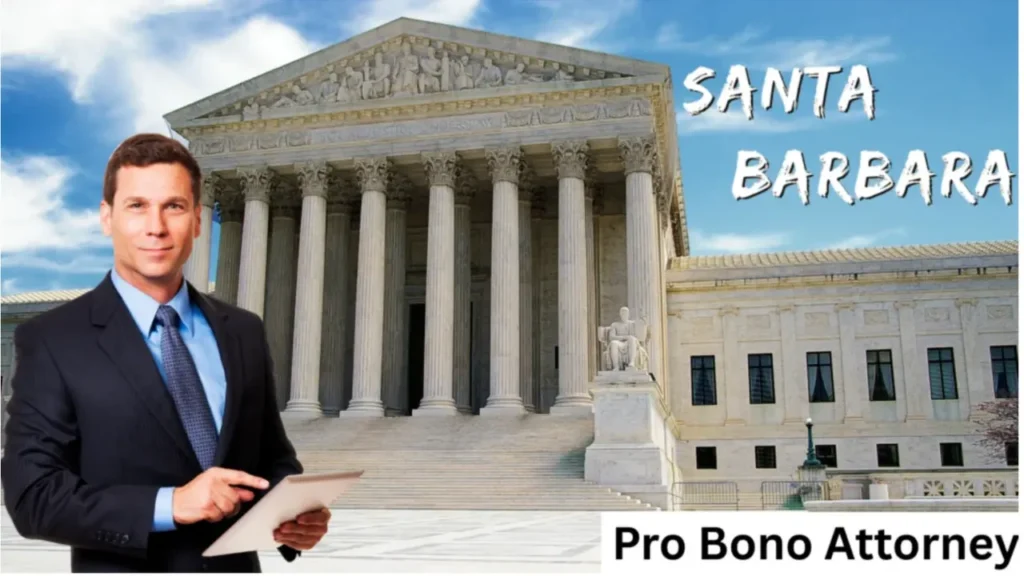How to Find a Pro Bono Attorney in Santa Barbara County.Facing a legal issue without the means to afford a lawyer can feel overwhelming. But if you live in Santa Barbara County, you’re not alone and you do have help available. Pro bono attorneys (those who volunteer free legal services) and nonprofit legal aid organizations work hard to help low-income individuals, seniors, immigrants, victims of abuse, and vulnerable community members access justice.
The given blog walks you through the key steps to find a pro bono lawyer in Santa Barbara County such as where to start, what services are offered, and how to qualify. Whether you are dealing with housing concerns, domestic violence, consumer debt, immigration, or elder issues, this guide serves as your roadmap to finding free legal support.
How to Find a Pro Bono Attorney in Santa Barbara County-Overview
| Article on | How to Find a Pro Bono Attorney in Santa Barbara County |
| Legal Aid Foundation of Santa Barbara County (LAFSBC) | Free civil legal help for housing, domestic violence, elder abuse, immigration for victims, consumer issues, guardianship. Runs clinics and self-help centers. |
| California Rural Legal Assistance (CRLA) | Supports rural residents, farmworkers, and low-income individuals with civil rights, health care, housing, and employment issues. |
| Immigrant Legal Defense Center (ILDC) | Pro bono representation for immigrants in deportation cases, juvenile status, and appeals. |
| Self-Help & Family Law Centers | Court-based assistance for forms, restraining orders, small claims, family law, and name changes. |
| LawHelpCA / State Bar Directory | Online directories to find pro bono and low-cost legal aid statewide, including Santa Barbara County programs. |
How to Find a Pro Bono Attorney in Santa Barbara County
1. Identify Your Legal Need and Affiliations
- Housing issues? (eviction, Section 8 loss, discrimination)
- Domestic violence / restraining orders?
- Elder or disability concerns (abuse, conservatorship)?
- Consumer or debt problems (scams, collections, bankruptcy)?
- Immigration support for crime victims or deportation risks?
- Immigrant defense for detained individuals?

2. Contact the Legal Aid Foundation of Santa Barbara County (LAFSBC)
LAFSBC is the most comprehensive local provider of civil legal pro bono services. They offer advice, representation, document assistance, and operate legal clinics across the county. Offices are located in Santa Barbara, Santa Maria, and Lompoc.
- Call your nearest office: Santa Barbara (805-963-6754), Santa Maria (805-922-9909), or Lompoc (805-736-6582).
- Explain your situation and ask to schedule an intake or attend a free clinic.
3. Explore Specialized Programs and Clinics
- Consumer Debt & Bankruptcy Clinic: Fridays from 10 am–12 pm; in-person in the U.S. Bankruptcy Court (1st & 3rd Fridays) and by phone on other Fridays.
- Senior Outreach: Free 30-minute consultations for individuals aged 60+; in-person Wednesdays, telephone first & third Thursdays.
- Project Outreach: Volunteer attorneys hold advice-only sessions at community centers, such as Goleta Valley Community Center (Thursdays 3–5 pm) and Franklin Neighborhood Center (Tuesdays 4–6 pm).
4. Visit Legal Resource Centers or Family Law Self-Help
- Self-Help Centers at the courthouse in Santa Barbara, Santa Maria, Lompoc offer assistance with filling out forms like small claims, name changes, landlord/tenant issues, restraining orders, and more.
- The Family Law Facilitator provides walk-in clinics and workshops for divorce, custody, and visitation matters often requiring attendance in classes first.
5. Contact Other Nonprofits or Directories
If LAFSBC doesn’t have capacity or you don’t qualify:
- Reach out to California Rural Legal Assistance (CRLA)—they serve Santa Maria and other areas with civil rights, employment, health care, and immigrant issues.
- For immigration defense, particularly for deportation or detained individuals, contact the Santa Barbara County Immigrant Legal Defense Center.
- Visit LawHelpCA.org or the State Bar’s Pro Bono Directory to find other local nonprofits and clinics.
6. Prepare for Intake or Clinic Visits
- Bring all relevant documents (notices, court papers, lease agreements, ID, income proof).
- Arrive early—many clinics run on a first-come, first-served basis (especially self-help centers).
- Be clear and concise about your situation and what kind of help you need.
7. Understand Limitations and Next Steps
- Many services prioritize clients below 200% of the federal poverty level, seniors, or specific vulnerable groups.
- Clinics may offer advice only—not full legal representation.
- If your case doesn’t qualify, they’ll usually refer you to other low-cost or private options.
Conclusion
Finding a pro bono attorney in Santa Barbara County is entirely possible when you know where to look. This guide covers the county’s key legal aid providers (LAFSBC, CRLA, the Immigrant Legal Defense Center), self-help centers, and statewide directories.
| Home Page | https://sbbarristers.com/ |
Start with a clear understanding of your issue, reach out to LAFSBC or another relevant nonprofit, prepare your documents, and attend the appropriate clinic. Even if you’re referred elsewhere, you’ll be closer to getting the legal help you need.
FAQs for How to Find a Pro Bono Attorney in Santa Barbara County
Ques.1. Do I qualify for free legal help in Santa Barbara County?
Most pro bono programs serve individuals at or below 200% of the federal poverty level, seniors (60+), victims of abuse, or other vulnerable groups. Always check eligibility when you call.
Ques.2. Can pro bono attorneys handle criminal cases?
No. Pro bono and legal aid services in Santa Barbara County focus on civil cases (housing, family law, immigration, consumer, elder issues). For criminal cases, you will usually be appointed a public defender if you cannot afford a lawyer.
Ques.3. How do I apply for help?
Call the Legal Aid Foundation of Santa Barbara County or the relevant organization, complete an intake interview, and bring necessary documents such as ID, income proof, and court papers.
